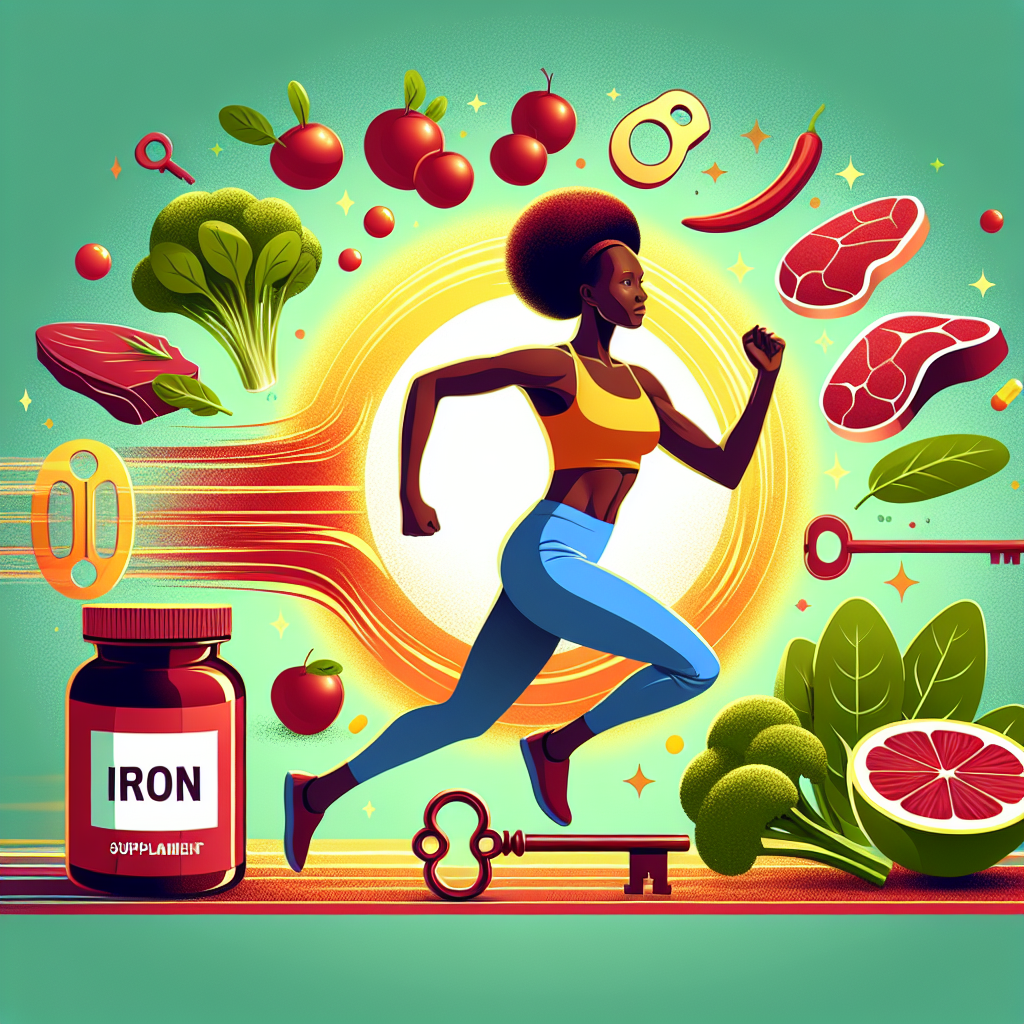The Importance of Iron for Women’s Health
Research indicates that iron plays a critical role in women’s health, particularly in maintaining energy levels and overall vitality (1). Iron is essential for the production of hemoglobin, a protein in red blood cells that transports oxygen throughout the body. This process is vital for ensuring that muscles, organs, and tissues receive the oxygen they need to function optimally. For women, adequate iron levels are particularly important due to factors such as menstruation, pregnancy, and higher susceptibility to iron deficiency anemia (2).
Iron Deficiency and Its Impact on Women
Studies show that iron deficiency is more prevalent among women than men, with an estimated 20% of women of reproductive age affected worldwide (3). Iron deficiency can lead to anemia, which manifests as fatigue, weakness, and decreased immune function. Research suggests that women who experience heavy menstrual bleeding are at an increased risk of developing iron deficiency anemia, highlighting the importance of monitoring iron levels and ensuring adequate intake (4).
During pregnancy, the demand for iron increases to support the growing fetus and the expansion of maternal blood volume. According to clinical findings, iron deficiency during pregnancy can lead to adverse outcomes such as preterm delivery and low birth weight (5). Therefore, it is crucial for pregnant women to maintain optimal iron levels through diet and supplementation if necessary.
Sources of Iron and Dietary Recommendations
Research suggests that women can meet their iron needs through a balanced diet rich in iron-containing foods (6). There are two types of dietary iron: heme iron, found in animal products such as red meat, poultry, and fish, and non-heme iron, found in plant-based sources like lentils, spinach, and fortified cereals. Studies indicate that heme iron is more readily absorbed by the body compared to non-heme iron (7).
To enhance iron absorption from plant-based sources, consuming vitamin C-rich foods alongside meals can be beneficial. Research shows that vitamin C can increase the absorption of non-heme iron by up to six times (8). Examples of vitamin C-rich foods include citrus fruits, bell peppers, and broccoli.
The Recommended Dietary Allowance (RDA) for iron varies based on age and life stage. For women aged 19-50, the RDA is 18 mg per day, while pregnant women require 27 mg per day (9). Postmenopausal women have a lower RDA of 8 mg per day, similar to men (10).
Iron Supplementation and Safety Considerations
In cases where dietary intake is insufficient to meet iron needs, supplementation may be necessary. Research suggests that iron supplements can help prevent and treat iron deficiency anemia, particularly in women with heavy menstrual bleeding or during pregnancy (11). However, it is important to consult with a healthcare provider before starting any supplementation regimen, as excessive iron intake can lead to adverse effects such as gastrointestinal distress and, in severe cases, organ damage (12).
Studies indicate that iron supplements are best absorbed when taken on an empty stomach, but they can cause stomach upset in some individuals. To mitigate this, taking iron supplements with a small amount of food or vitamin C can help improve tolerability without significantly reducing absorption (13).
Iron and Cognitive Function
Emerging research suggests that iron plays a role in cognitive function and brain health (14). Iron is essential for the production of neurotransmitters and the maintenance of myelin, a protective sheath around nerve fibers. Studies indicate that iron deficiency can lead to impaired cognitive performance, including decreased attention, memory, and learning abilities (15).
In women, iron deficiency has been associated with an increased risk of developing restless legs syndrome (RLS), a condition characterized by an irresistible urge to move the legs, often accompanied by uncomfortable sensations (16). Research suggests that treating iron deficiency can alleviate RLS symptoms and improve sleep quality (17).
Iron and Athletic Performance
For women engaged in regular physical activity or competitive sports, maintaining optimal iron levels is crucial for athletic performance (18). Research shows that iron deficiency can lead to decreased endurance, increased fatigue, and impaired muscle function, all of which can negatively impact athletic performance (19).
Studies indicate that female athletes, particularly those involved in endurance sports like distance running or cycling, are at a higher risk of developing iron deficiency due to factors such as increased iron losses through sweat and the impact of intense training on iron metabolism (20). Therefore, monitoring iron status and ensuring adequate intake through diet and, if necessary, supplementation is essential for female athletes to optimize their performance and overall health.
Takeaways
- Iron is essential for women’s health, playing a crucial role in oxygen transport, energy levels, and overall vitality.
- Iron deficiency is more common in women due to factors such as menstruation and pregnancy, and can lead to anemia and impaired cognitive function.
- A balanced diet rich in iron-containing foods, along with vitamin C to enhance absorption, can help meet women’s iron needs.
- Iron supplementation may be necessary in cases of deficiency, but should be done under the guidance of a healthcare provider to ensure safety and effectiveness.
- Maintaining optimal iron levels is particularly important for female athletes to support athletic performance and overall health.
By understanding the importance of iron and taking proactive steps to maintain adequate levels, women can support their overall health, energy, and well-being. As women, we have the power to prioritize our health and make informed choices to optimize our iron status.
SOURCES
Click to expand
- Iron deficiency and anemia in women
- WHO: Anaemia
- Prevalence of iron deficiency in women
- Iron deficiency anemia in women with heavy menstrual bleeding
- Iron deficiency during pregnancy and adverse outcomes
- Dietary sources of iron and recommendations
- Heme vs. non-heme iron absorption
- Vitamin C and iron absorption
- NIH: Iron – Health Professional Fact Sheet
- NIH: Iron – Health Professional Fact Sheet
- Iron supplementation for iron deficiency anemia
- Safety considerations for iron supplementation
- Optimizing iron supplement absorption and tolerability
- Iron and cognitive function
- Iron deficiency and cognitive performance
- Iron deficiency and restless legs syndrome
- Treating iron deficiency for restless legs syndrome
- Iron and athletic performance
- Iron deficiency and athletic performance
- Iron deficiency in female athletes

